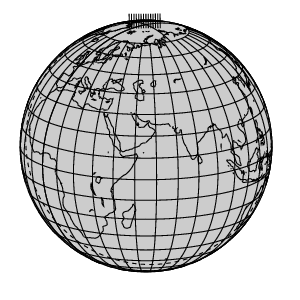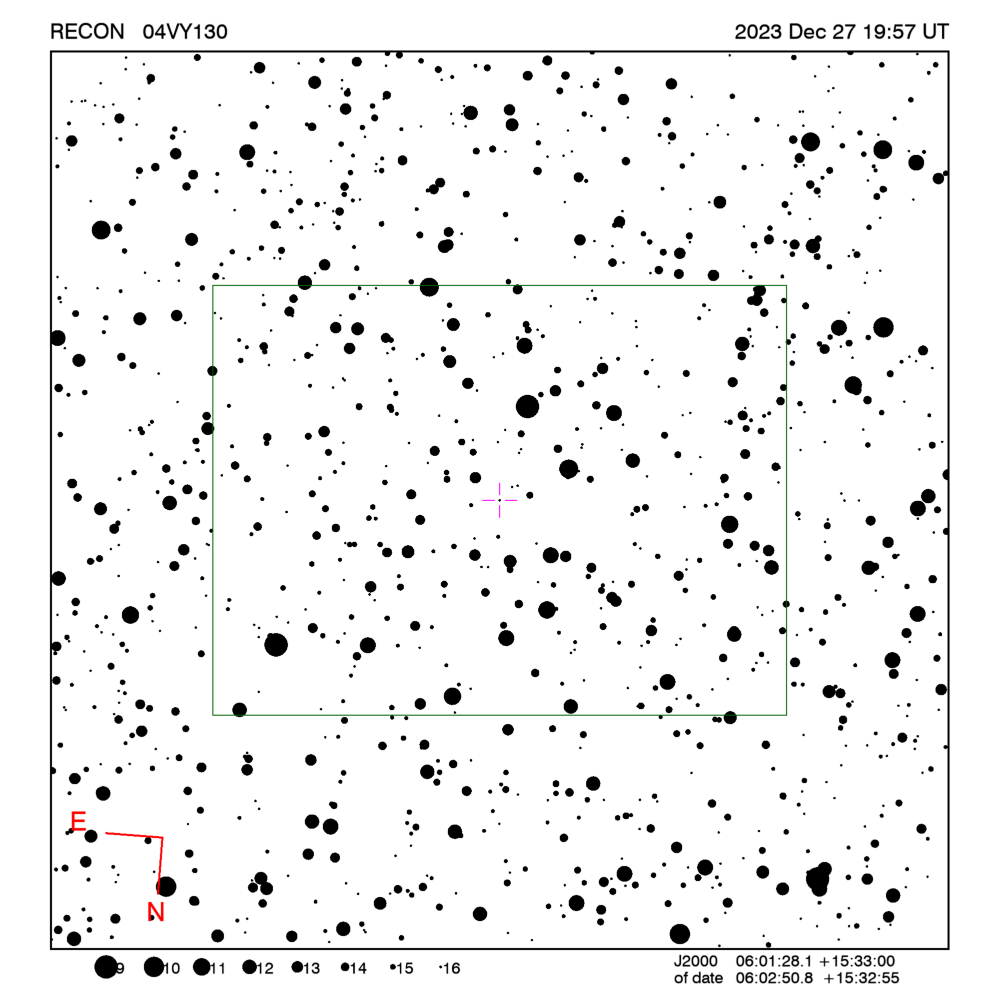RECON: TNO occultation with 04VY130
Event between 04VY130 and star GA1040:01425590
with event index number of 2568606
Geocentric closest approach at 2023/12/27 19:56:38 UTC
J2000 position of star is 06:01:28.1 +15:33:00
Equinox of date position of star is 06:02:47.5 +15:32:55
Stellar brightness G=16.7,
use SENSEUP=128 with the MallinCam and and exposure
time of 2 seconds with the QHY174 camera.
Star is 20 degrees from the moon.
Moon is 99% illuminated.
Apparent brightness V=22.8
 Object is 30.7 AU from the Sun
and 29.7 AU from the Earth.
Object is 30.7 AU from the Sun
and 29.7 AU from the Earth.
Apparent velocity is 24.3
km/sec on the sky relative to the star, or,
4.1 arcsec/hr.
The 1-sigma error in the time of the event is 213 seconds.
The 1-sigma cross-track error in the shadow position is
1404 km.
The object has an absolute magnitude Hv=8.0
Diameter=152.8 km assuming a 5% albedo -- 6.2 sec chord
Diameter=62.4 km assuming a 30% albedo -- 2.5 sec chord
Dynamical classification is 3:2E
Star training set for 04VY130, (2023/12/27 19:57UT)
Object RA Dec mag sep mel
Betelgeuse 05:56:28.3 +07:24:34 0.4 8.29 27
Alhena 06:39:05.8 +16:22:36 1.9 8.75 13
137 Tau 05:53:44.1 +14:10:33 5.5 2.59 22
PPM 121788 06:03:25.3 +15:12:17 8.2 0.37 20
PPM 121724 06:01:20.7 +15:36:35 9.4 0.37 20
PPM 121785 06:03:16.9 +15:37:42 10.1 0.13 19
04VY130 06:02:50.8 +15:32:55 16.7 19
Positions are for equinox of date

Azimuth is measured in degrees eastward from north.
North is at an azimuth of 0, due East is at an azimuth
of 90 degrees, due South is 180, and due West is 270.
Do not use the listing below for the RECON CPC 1100 telescopes.
This is provided for other non-team facilities.
Star training set for 04VY130, (2023/12/27 19:57UT)
Object RA Dec mag sep mel
Betelgeuse 05:55:10.3 +07:24:26 0.4 8.29 27
Alhena 06:37:42.8 +16:23:57 1.9 8.75 13
137 Tau 05:52:22.2 +14:10:18 5.5 2.59 22
PPM 121788 06:02:02.8 +15:12:23 8.2 0.37 20
PPM 121724 05:59:58.0 +15:36:37 9.4 0.37 20
PPM 121785 06:01:54.2 +15:37:47 10.1 0.13 19
04VY130 06:01:28.1 +15:33:00 16.7 20
Positions are for J2000
Event circumstances last updated at 2023/01/12 04:48:44 UT
Marc W. Buie,
Southwest Research Institute
RECON
 Object is 30.7 AU from the Sun
and 29.7 AU from the Earth.
Object is 30.7 AU from the Sun
and 29.7 AU from the Earth.
